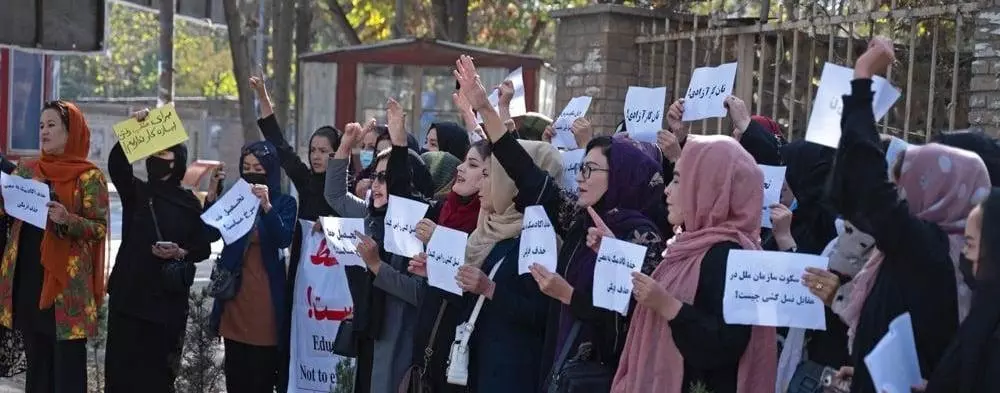
Once again: Taliban restricts women's access to education
text_fieldsDismal news has been reported from Afghanistan once again. The Taliban government has banned girls from entering universities. This reactionary move should be interpreted as an indication that the Taliban, which had laboured to convince the world that it was making progress following its takeover of power from the Americans, is now reverting to the old tribal tradition. After the higher education minister announced the government's new decision on Tuesday, widespread protests emerged in the country. In the capital Kabul which is home to many universities, female students in traditional garb staged demonstrations outside campuses. Boys also boycotted classes on the campuses in solidarity with the girl students. Three months ago, the Taliban had allowed thousands of girls and women to sit for university entrance exams in most provinces, raising hopes. Now the student community is reportedly very upset and unhappy that all of this has suddenly fallen apart.
The Taliban regained control of the government in August 2021 after the US withdrew its troops from Afghanistan. Hailing it as a victory for the Afghans' liberation struggle, the Taliban assumed power by loudly proclaiming their readiness for change. Before 2001, Taliban's five years of control cost the Afghan people a great deal of their freedom, but many nations nevertheless showed them respect because it meant that foreign forces no longer existed and that a nation had just regained its sovereignty. Things changed soon after the US military took over. As part of that, some figures show that women's participation in higher education increased 20-fold between 2001 and 2018, as the U.S.-controlled Afghan government improved freedom and opportunity for female education. When Taliban came to power once again in 2021, iternational observers and diplomatic communities believed that the Taliban would not be influenced by the same views and "reactionary" beliefs or ingrained tribal cultural practices in Afghan society which it had 20 years ago. The parties involved in the peace negotiations with Taliban representatives that took place in Doha for a while also had such indications. As soon as they took power, spokespersons like the new foreign minister, Zabiullah Mujahid, declared publicly that they were changing their stance on issues like women's education and related matters. The Taliban's response to the demands for more freedoms was that they needed some time to overcome generational traditions and the world should avoid the stancethat it would deal with Taliban only if they establish a 'modern' nation in hurry.
Based on the Taliban's track record, political analysts had been raising concerns about the likelihood of a change for the Taliban. Trends visible in Afghanistan do validate this too. What was in display in Kabul and Kandahar, the stronghold of Taliban, was girls being sent back from universities as much as at higher secondary level. The root cause of this is the Taliban's misinterpretation of the role of women in the Islamic social structure. For some reason, the Taliban, who proclaim themselves to be the front-line defenders of Islam, have somehow failed to include the freedom and equal participation of women in public affairs that the Islamic world generally accords to them, with certain restrictions that are required in accordance with religious teachings. Global Islamic scholars had observed at the very outset of the Taliban's emergence on the scene, that they were misinterpreting the concepts of women's freedom generally held by Muslim nations simply because they are not compatible with their tribal traditions. They fail to realise that Afghanistan loses not only its standing in the eyes of the world but also the industrial and commercial ties with the outside world as also the creative human resources. Afghanistan can only begin to surge ahead on the path of nation-building by allowing women, who make up half of the population, access to the windows of freedom and knowledge thereby liberating themselves from this self-inflicted darkness.


























